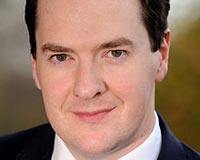 Chancellor George Osborne is to allow councils to set business rates and keep the money they raise, in a radical move to revitalise high streets.
Chancellor George Osborne is to allow councils to set business rates and keep the money they raise, in a radical move to revitalise high streets.
Osborne described the policy, announced in a speech at Conservative Party conference in Manchester, as “the biggest transfer of power to our local government in living memory”.
He said: “We are going to allow local government to keep the rates they collect from business.
“That’s right, all £26bn of business rates will be kept by councils instead of being sent up to Whitehall.”
The policy comes after years of intense criticism of the rating system, which is seen as unfairly punishing high street shops compared with online retailers and based on outdated values.
“Right now, we collect much more in business rates than we give back in the main grant,” Osborne said.
“So we will phase out this local government grant altogether. But we will also give councils extra power and responsibilities for running their communities.
“The established transfers will be there on day one, but thereafter, all the real growth in revenue will be yours to keep. So this is what our plan means.
“Attract a business and you attract more money. Regenerate a high street, and you will reap the benefits. Grow your area, and you will grow your revenue too.”
He said that the Conservatives would “abolish the uniform business rate entirely”.
“That’s the single, national tax rate we impose on every council,” Osborne added. “Any local area will be able to cut business rates as much as they like to win new jobs and generate wealth.”
British Property Federation chief executive Melanie Leech described the policy as a “big move from government” but called for more detail as to how it would be implemented.
“Removing the local government grant will mean that local authorities are entirely dependent on business rates and council tax, which could distort the way in which these taxes are collected,” she said.
“Those local authorities that have a high business rates take, such as those in central London, will be able to reduce their rate level and make their areas more competitive for businesses to locate there. Those that are already struggling could end up raising their rates in order to try to create revenue, which in turn will make them less attractive to business, which could lead to a patchwork of inequality across the country.”










